Selecting an Electronic Health Record (EHR) system is a foundational step for any small medical practice. The right system streamlines workflows, improves patient care, and ensures financial health, while the wrong one can lead to burnout, administrative headaches, and wasted resources. For small practices, the challenge is finding a solution that is affordable, scalable, and doesn't require a dedicated IT department to manage. Finding the best EHR systems for small practices means looking beyond flashy features to what truly supports your daily operations and long-term growth. An EHR isn't just a digital filing cabinet; it's the central nervous system of your clinic, impacting everything from patient encounters to revenue cycle management.
This guide cuts through the noise. We offer a direct comparison of the top platforms designed specifically for the unique needs of independent and growing clinics. We will explore critical factors like implementation, real-world usability, transparent pricing, and how each system supports your core mission: delivering excellent patient care. Because an EHR is central to your practice's operations, understanding the principles of effective small business document management is crucial for a smooth transition and ongoing success. A well-chosen EHR becomes a strategic asset, empowering your practice to compete effectively and thrive in an increasingly complex healthcare landscape.
Below, you’ll find a detailed analysis of 12 leading EHR solutions. Each review includes key features, potential drawbacks, pricing insights, and direct links so you can evaluate them for yourself.
1. Practice Fusion (by Veradigm)
Practice Fusion, now part of Veradigm, has long been a favorite among independent practices, making it one of the best EHR systems for small practices seeking simplicity and predictable costs. Its cloud-based platform is designed specifically around the workflows of smaller clinics, avoiding the complexity and steep learning curves often found in systems built for large hospitals. The interface is clean and intuitive, focusing on core ambulatory functions like charting, e-prescribing, and managing lab and imaging orders. This focus on core clinical tasks without unnecessary bloat is what makes it so appealing for providers who value speed and efficiency during patient encounters.
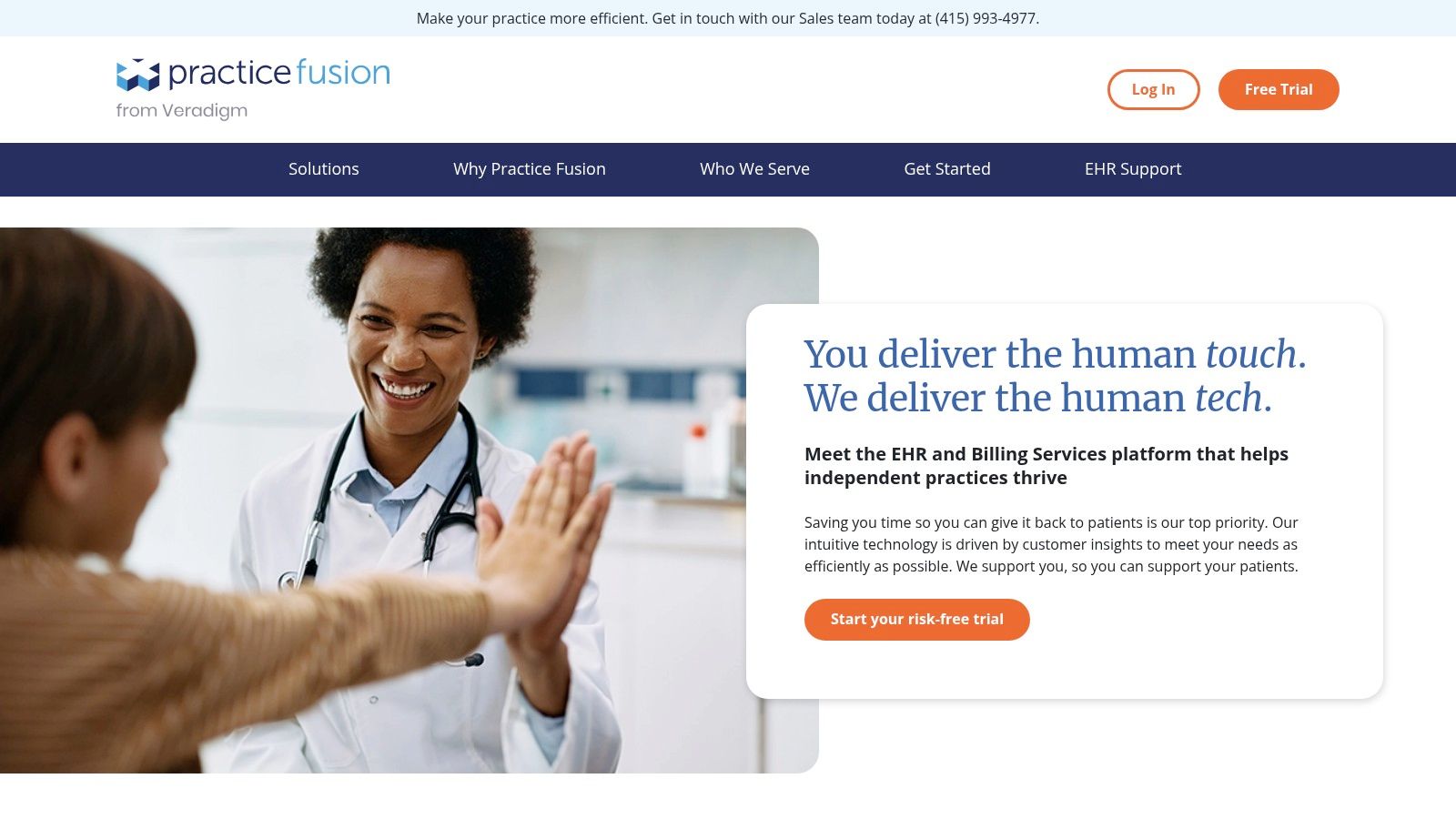
What truly sets it apart is its transparent, flat-rate pricing model. For a single monthly fee per provider, practices get the full, ONC-certified EHR, a patient portal, and built-in MIPS reporting dashboards. This straightforward approach eliminates the guesswork common with other vendors, allowing small practices to budget with confidence. While the platform is robust for clinical tasks, it has limited native tools for practice marketing or advanced business analytics. Additionally, some integrations, like electronic prescribing for controlled substances (EPCS), may require an add-on fee. This makes it an excellent choice for practices prioritizing clinical functionality over all-in-one business management.
Key Details:
- Best For: Solo practitioners and small ambulatory clinics needing a user-friendly, all-in-one clinical solution.
- Pricing: Publicly listed flat-rate subscription of $149 per provider per month, which includes three staff user seats.
- Website: https://practicefusion.com
2. eClinicalWorks
eClinicalWorks offers a comprehensive, all-in-one suite that combines EHR, practice management, and patient engagement tools, making it one of the best EHR systems for small practices that plan to grow. The platform is designed to scale, providing a unified solution that can support a solo practitioner just as effectively as a multi-provider group. Its cloud-based system ensures accessibility, disaster recovery, and mobile access through dedicated apps, which is a significant advantage for providers who need flexibility. This unified architecture eliminates the need to manage multiple vendors and ensures seamless data flow between clinical and administrative departments.
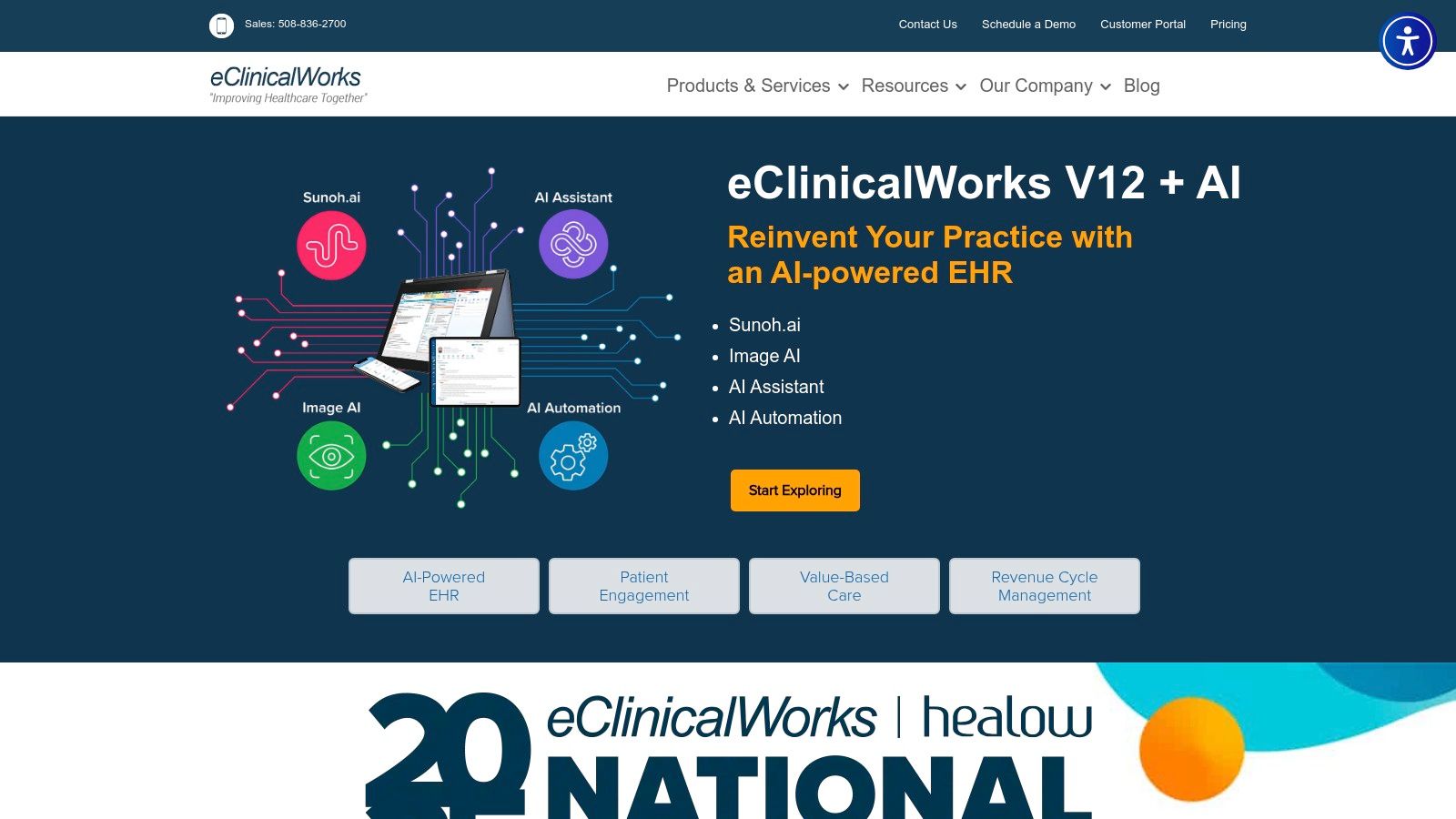
The platform stands out with its transparent, tiered pricing and the option to add full revenue cycle management (RCM) services for a percentage of collections. This flexibility allows practices to choose the level of service that best fits their operational capacity. While the robust functionality is a major plus, it comes with a steeper learning curve compared to simpler systems. Practices should also be aware that certain transactions, like high volumes of patient statements or messages, may incur additional fees not included in the base subscription. However, for a practice seeking a powerful, long-term solution, investing time in electronic health record optimization with eClinicalWorks can yield significant returns in efficiency and growth potential.
Key Details:
- Best For: Small to medium-sized practices looking for a scalable, all-in-one EHR and practice management solution.
- Pricing: Publicly listed plans start at $499 per provider per month for the EHR-only tier and $599 for the combined EHR/PM bundle.
- Website: https://www.eclinicalworks.com
3. Office Ally EHR 24/7
Office Ally has carved out a niche as one of the best EHR systems for small practices primarily driven by budget constraints. Its main appeal is the integration of a low-cost EHR with its free Practice Mate practice management system and often-free Office Ally clearinghouse services. This creates an exceptionally affordable, all-in-one ecosystem for managing both the clinical and financial sides of a practice, making it ideal for new, solo, or low-volume clinics where every dollar counts. The ability to manage scheduling, billing, and clinical notes from a single, low-cost vendor is a powerful proposition for practices in their early stages.
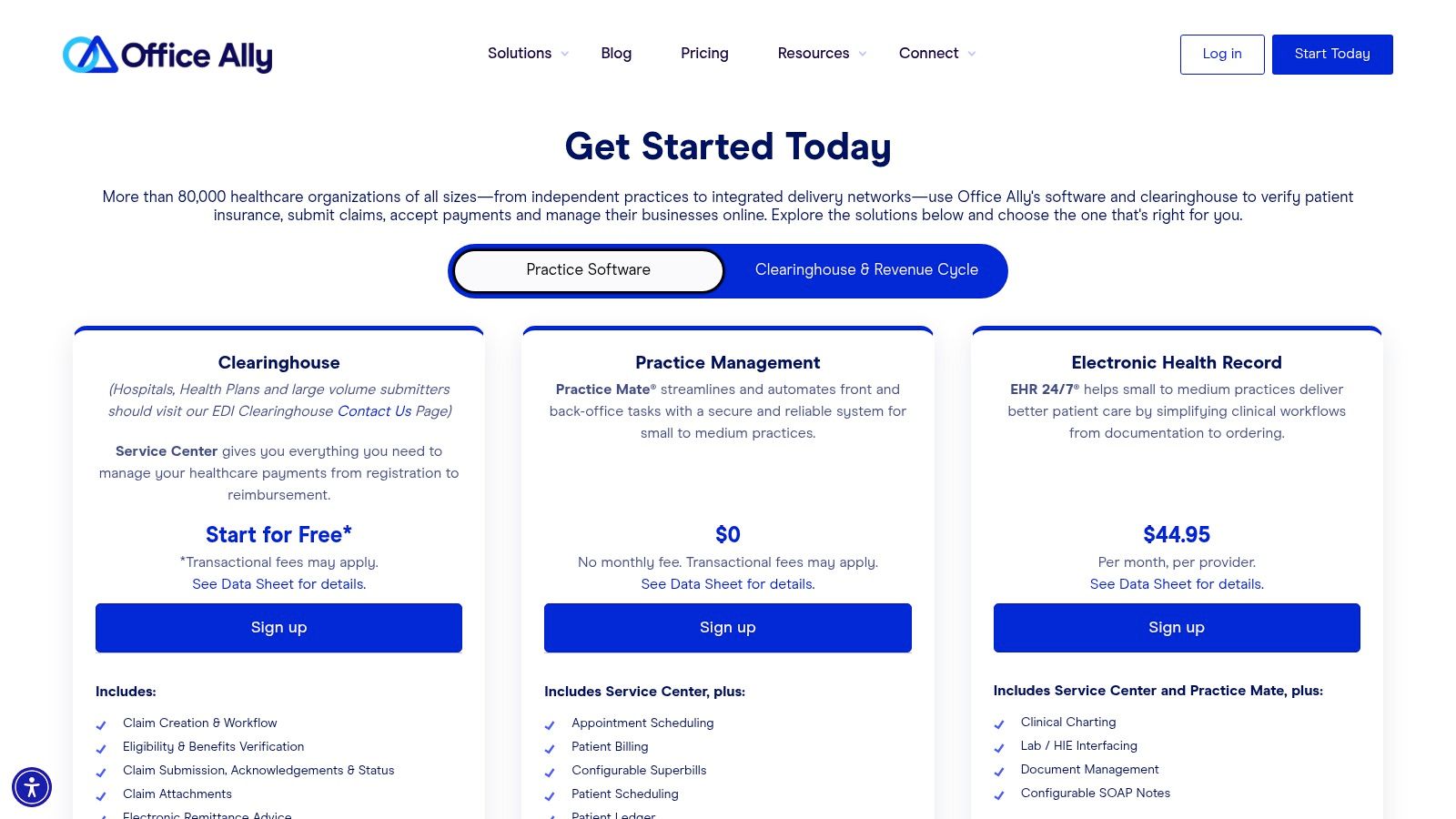
The platform's strength lies in its price-to-feature ratio. While the user interface is more basic and less modern than premium competitors, it covers the essential functions needed for daily operations, including charting, lab integration, and basic reporting. However, practices should be aware of its modular pricing structure. Core EHR access is very cheap, but necessary functions like e-prescribing, patient reminders, and the patient portal are priced as separate add-ons. The total cost can increase depending on which modules a practice needs, so it's important to calculate the full price based on specific workflow requirements before committing.
Key Details:
- Best For: New practices, solo providers, or low-volume clinics needing a functional, budget-friendly, all-in-one solution.
- Pricing: Starts at $29.95 per provider per month for the base EHR. The Practice Mate PM and clearinghouse are often free, but add-ons cost extra.
- Website: https://cms.officeally.com/pricing
4. Elation Health
Elation Health is specifically engineered for primary care, making it one of the best EHR systems for small practices focused on longitudinal patient relationships. Its "Clinical First" philosophy shines through in a user interface designed to present a comprehensive, chronological patient story in a single view, minimizing clicks and administrative burden. This approach is particularly valued in direct primary care (DPC) and value-based care models, where continuity and deep patient understanding are paramount. The platform excels at tracking patient history, managing chronic conditions, and facilitating proactive care, helping physicians think like physicians, not data entry clerks.
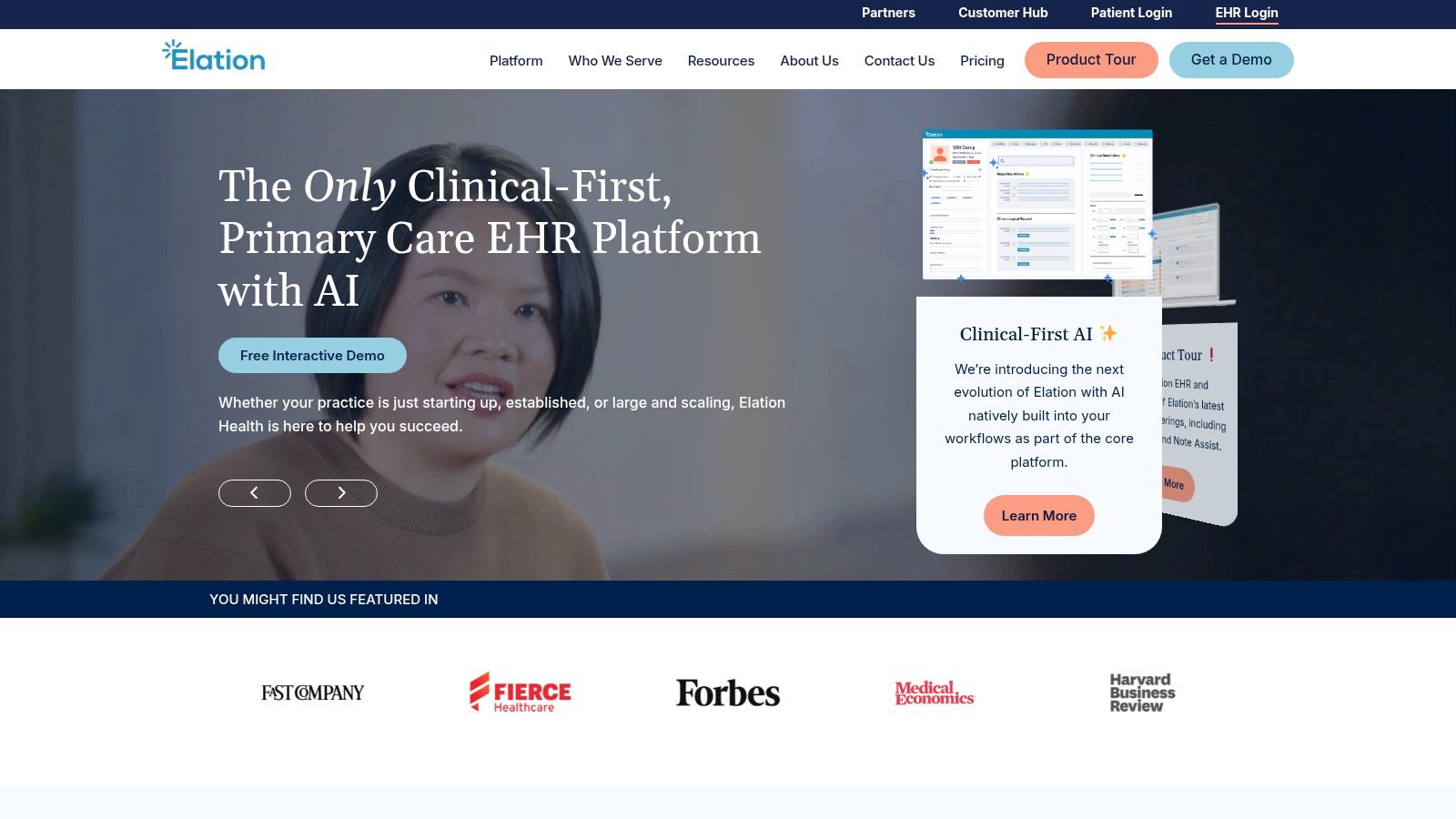
What makes Elation stand out is its commitment to the clinician's experience. Features like integrated telehealth, real-time eligibility checks, and an AI note-assist function are built to streamline workflows rather than disrupt them. The company provides transparent pricing for its different packages, allowing practices to choose a plan that fits their needs without hidden fees. However, its specialized focus means it may be less suitable for complex multi-specialty groups that require highly specific templates or workflows. The pricing is also higher than some basic EHRs and requires an annual commitment, reflecting its premium, primary-care-centric feature set and dedication to user experience.
Key Details:
- Best For: Direct primary care (DPC) practices and small primary care clinics prioritizing clinical efficiency and continuity of care.
- Pricing: Publicly listed packages starting at $275 per clinical provider per month (billed annually) for the standard EHR. Billing and premium features cost more.
- Website: https://www.elationhealth.com
5. athenahealth (athenaOne)
athenahealth offers athenaOne, a cloud-based suite combining EHR, practice management, and revenue cycle management services. It stands out by functioning as a co-sourced partner rather than just a software vendor, making it one of the best EHR systems for small practices that want to offload administrative burdens. The platform is known for its powerful network insights, leveraging data from thousands of practices to streamline workflows and update payer rules automatically, which helps reduce claim denials and administrative rework. This proactive approach to billing intelligence is a major differentiator in the market.
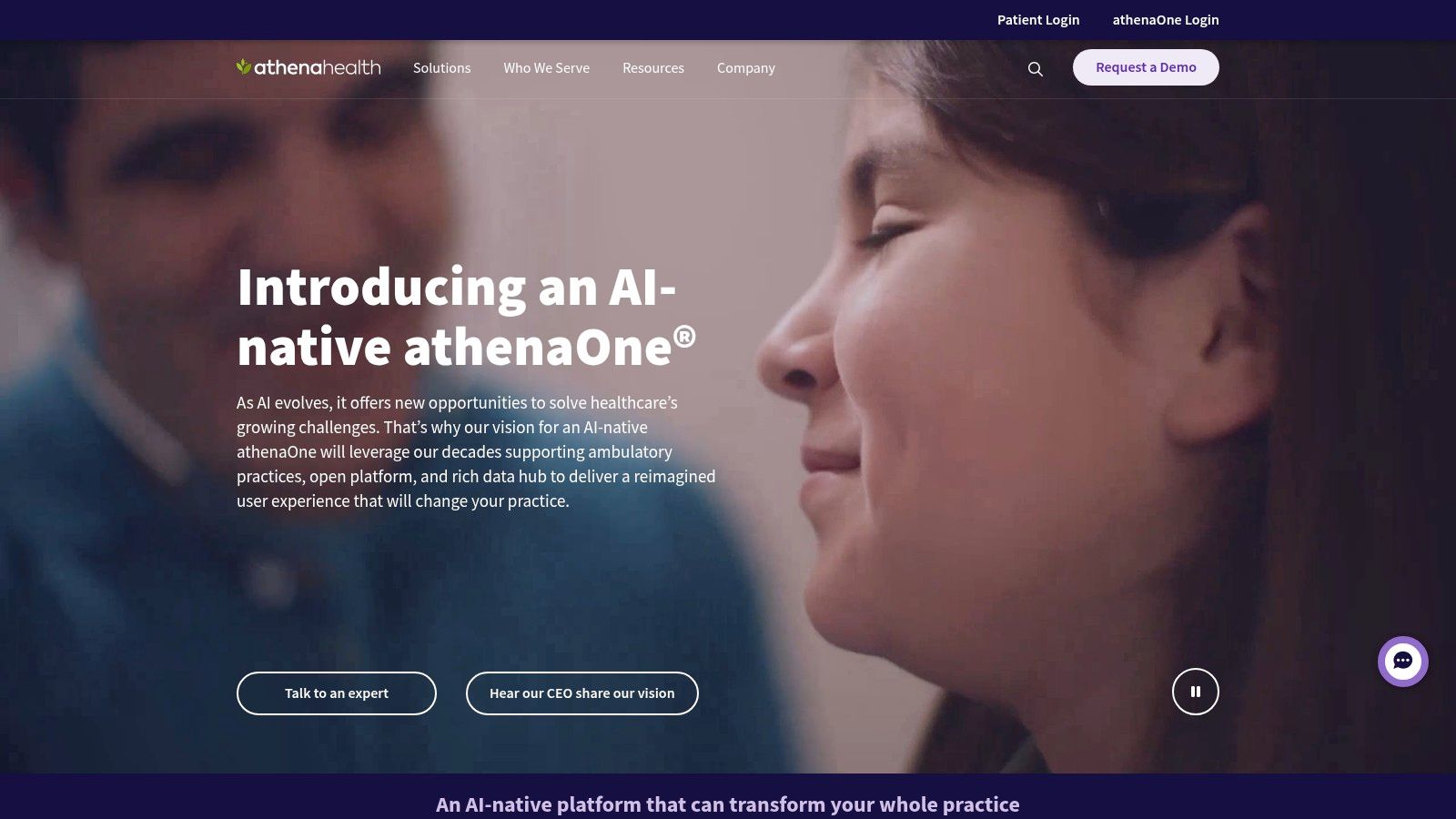
The platform’s commercial model is its most unique feature: pricing is typically a percentage of practice collections. This success-aligned model means athenahealth is financially motivated to maximize your revenue, a compelling proposition for growth-focused clinics. This approach minimizes upfront costs and aligns the vendor’s success with the practice’s cash flow, creating a true partnership. However, this collections-based pricing can feel less predictable than a flat-rate subscription and may not be the ideal fit for every financial model, particularly those with inconsistent revenue streams or very high-margin services. It's best for practices that want to focus on care delivery and leave the complexities of RCM to an expert partner.
Key Details:
- Best For: Small to medium-sized practices seeking an integrated solution with outsourced billing and RCM support to maximize collections.
- Pricing: Based on a percentage of practice collections; specific rates vary by specialty, size, and volume. No long-term contracts are required.
- Website: https://www.athenahealth.com
6. AdvancedMD
AdvancedMD stands out as one of the best EHR systems for small practices due to its highly modular and scalable design. Its cloud-based platform combines EHR, practice management, and billing into a unified suite, allowing clinics to build a custom solution that fits their exact needs and budget. The system is particularly beneficial for practices that anticipate growth or have specialized workflows, as it offers a vast ecosystem of add-on features and specialty-specific editions for areas like physical therapy, mental health, and more. This adaptability prevents practices from outgrowing their software.
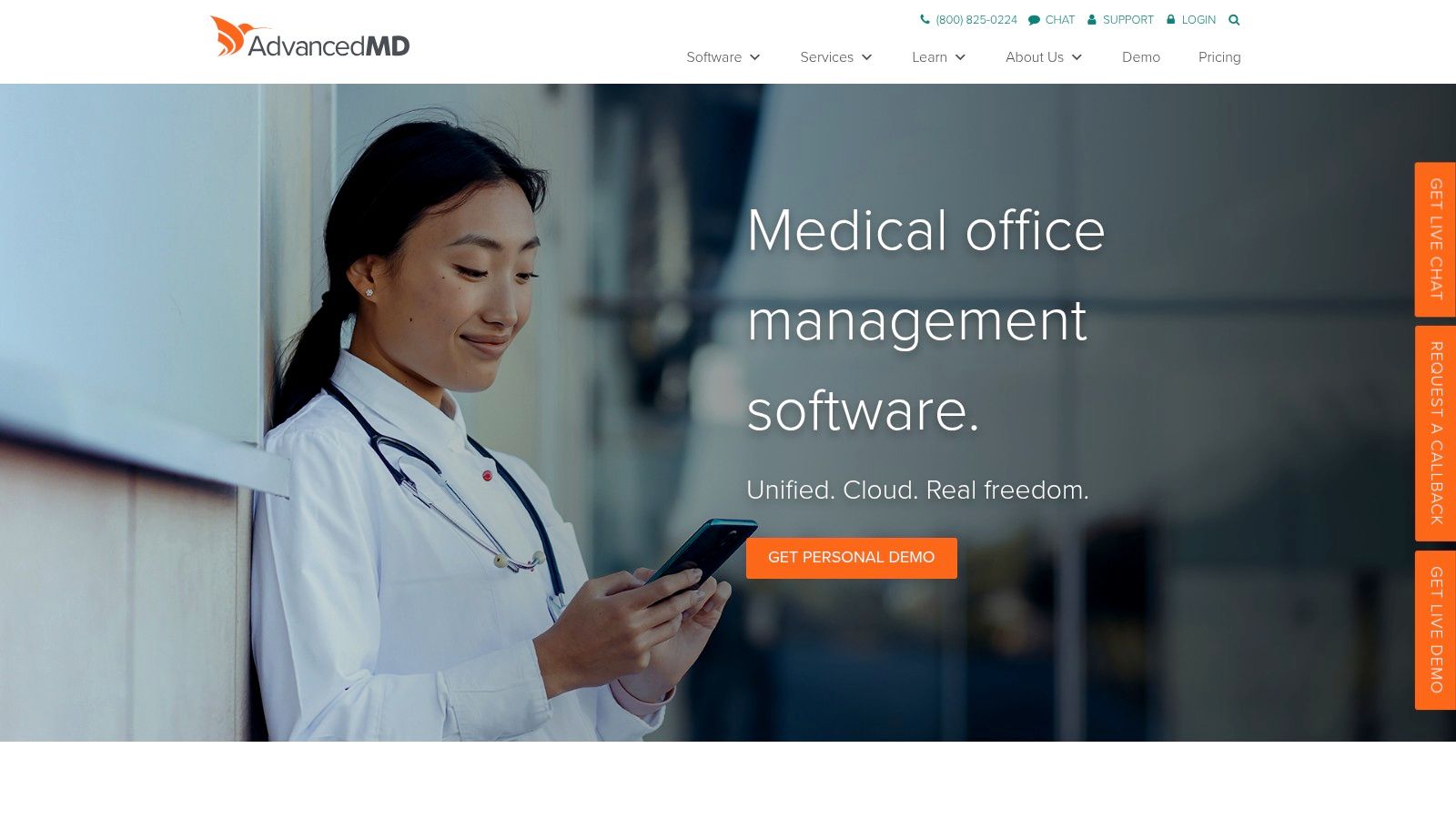
The platform’s greatest strength lies in its flexible pricing. Practices can choose a traditional per-provider subscription or an innovative per-encounter model, which is ideal for very low-volume or part-time clinics where fixed monthly costs are prohibitive. While this à la carte approach provides unparalleled customization, it can also lead to higher overall costs once essential features like telemedicine or patient reminders are added. The platform’s robust capabilities for healthcare workflow automation are a key benefit, though many useful tools are considered optional add-ons rather than core features. Prospective customers should carefully map their needs to the "build-a-bundle" tool to get an accurate cost estimate.
Key Details:
- Best For: Growing practices, specialty clinics, and low-volume providers needing a highly customizable, scalable solution.
- Pricing: Custom-quoted based on a "build-a-bundle" tool; offers both per-provider and per-encounter pricing models.
- Website: https://www.advancedmd.com
7. CareCloud (Charts + Central + Concierge)
CareCloud offers a modern, integrated suite that combines its EHR (Charts), practice management (Central), and revenue cycle management (Concierge) into a unified platform. Its key advantage is flexibility, making it one of the best EHR systems for small practices that want to scale technology with their growth. Practices can start solely with the powerful practice management module and add the clinical EHR component later, avoiding a large upfront commitment. The user interface is clean and Mac-friendly, a notable contrast to many older, Windows-based systems, which appeals to practices with a modern technology stack.
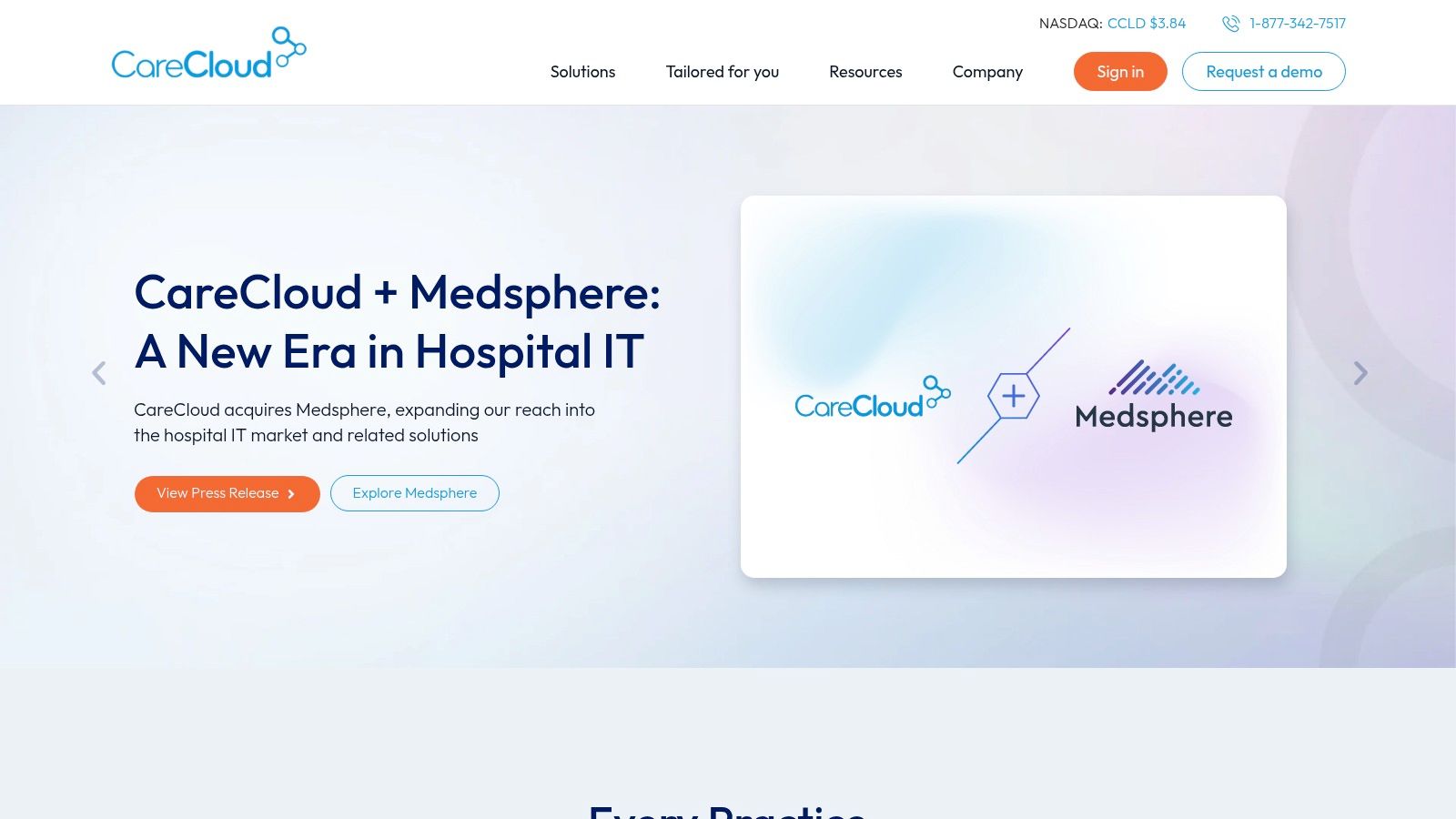
The platform stands out with customizable templates and strong patient engagement tools like the Breeze add-on, which streamlines check-in, payments, and communication, improving the overall patient experience. This modular approach allows a practice to build a system that fits its exact needs, from basic scheduling to comprehensive clinical documentation. However, this flexibility comes at a cost. While pricing is competitive, practices should be aware of potential setup and implementation fees. Additionally, add-on modules and multi-year contracts can increase the total cost of ownership over time, so it's crucial to clarify all expenses during the sales process to avoid unexpected charges.
Key Details:
- Best For: Small to mid-sized practices seeking a modern, scalable solution that integrates clinical, administrative, and billing functions.
- Pricing: Custom-quoted based on modules and practice size; published base plans start around $349 per provider per month, but expect implementation fees and add-on costs.
- Website: https://www.carecloud.com
8. NextGen Office (for small practices)
NextGen Office is a cloud-based, all-in-one EHR and practice management solution tailored specifically for the needs of independent clinics. Its mobile-first design makes it one of the best EHR systems for small practices whose providers need to access patient information on tablets or smartphones, whether in the exam room or on call. The platform is built for efficiency, integrating clinical charting with essential administrative functions like eligibility checks, claims processing, and a patient portal, all within a single, streamlined interface that reduces the need to switch between applications.
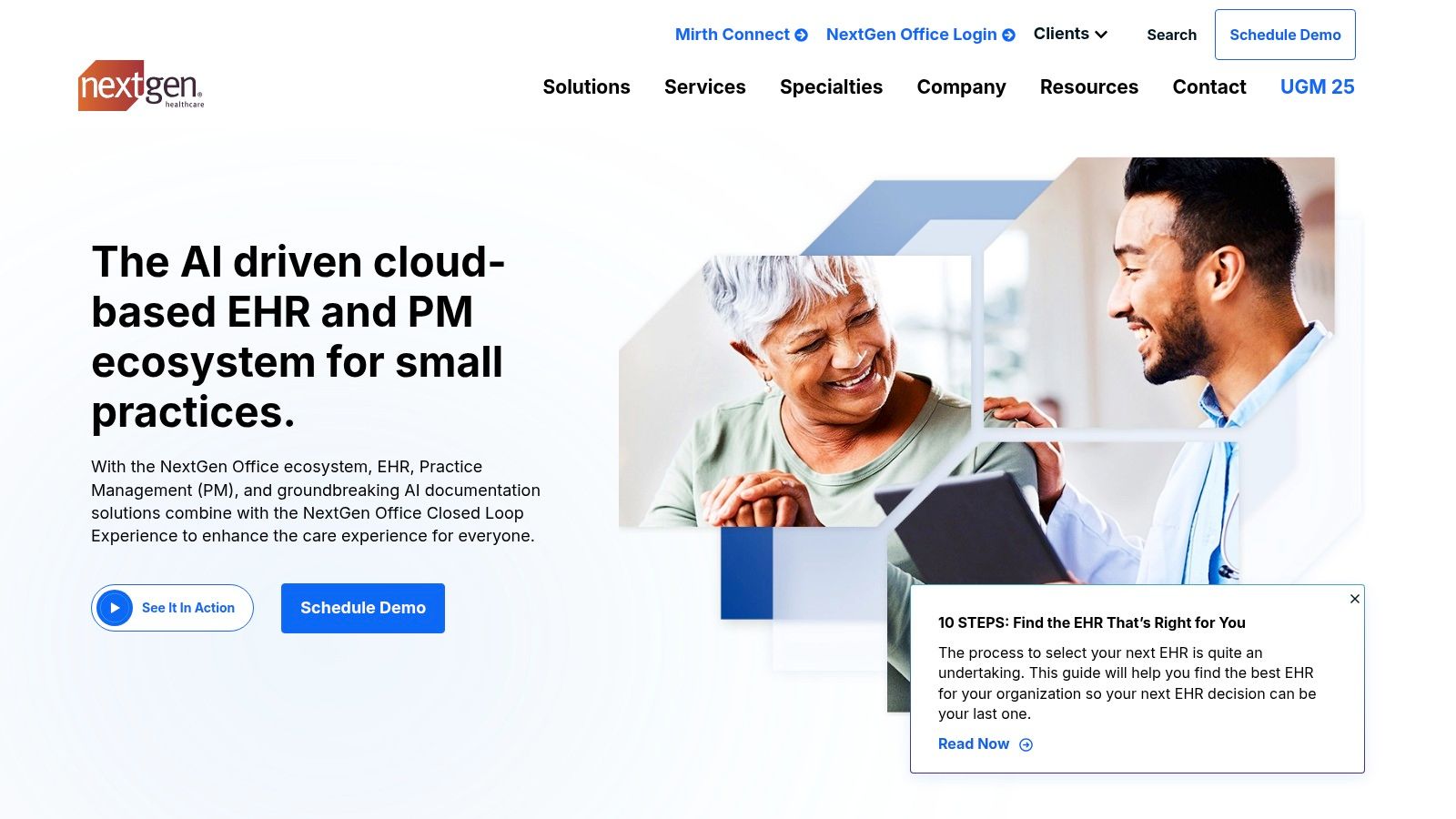
A key differentiator for NextGen Office is its AI Ambient Assist feature, which listens to patient conversations and automatically generates structured SOAP notes, drastically reducing documentation time for physicians. This innovative tool directly addresses a primary cause of provider burnout. While the system is robust and includes comprehensive training and support, its pricing is not publicly available and requires a custom quote. This lack of transparency can be a drawback for small practices on a tight budget, as add-on services can also increase the total investment. It is best suited for practices willing to invest in premium, time-saving technology.
Key Details:
- Best For: Small, independent practices prioritizing mobile access and seeking to reduce administrative burden with AI-powered documentation.
- Pricing: Available upon request through a custom quote; pricing is not publicly listed.
- Website: https://www.nextgen.com/solutions/electronic-health-records/small-practices-nextgen-office
9. Tebra (formerly Kareo Clinical)
Tebra is the result of a merger between Kareo and PatientPop, creating a comprehensive platform designed to manage the entire patient journey for independent practices. It combines a user-friendly clinical EHR with robust practice management and marketing tools, making it one of the best EHR systems for small practices focused on growth and patient acquisition. The system is entirely cloud-based and boasts a mobile-friendly interface, allowing providers to manage charts, prescriptions, and messages from anywhere. This integration of clinical and marketing functions in one platform is its core value proposition.
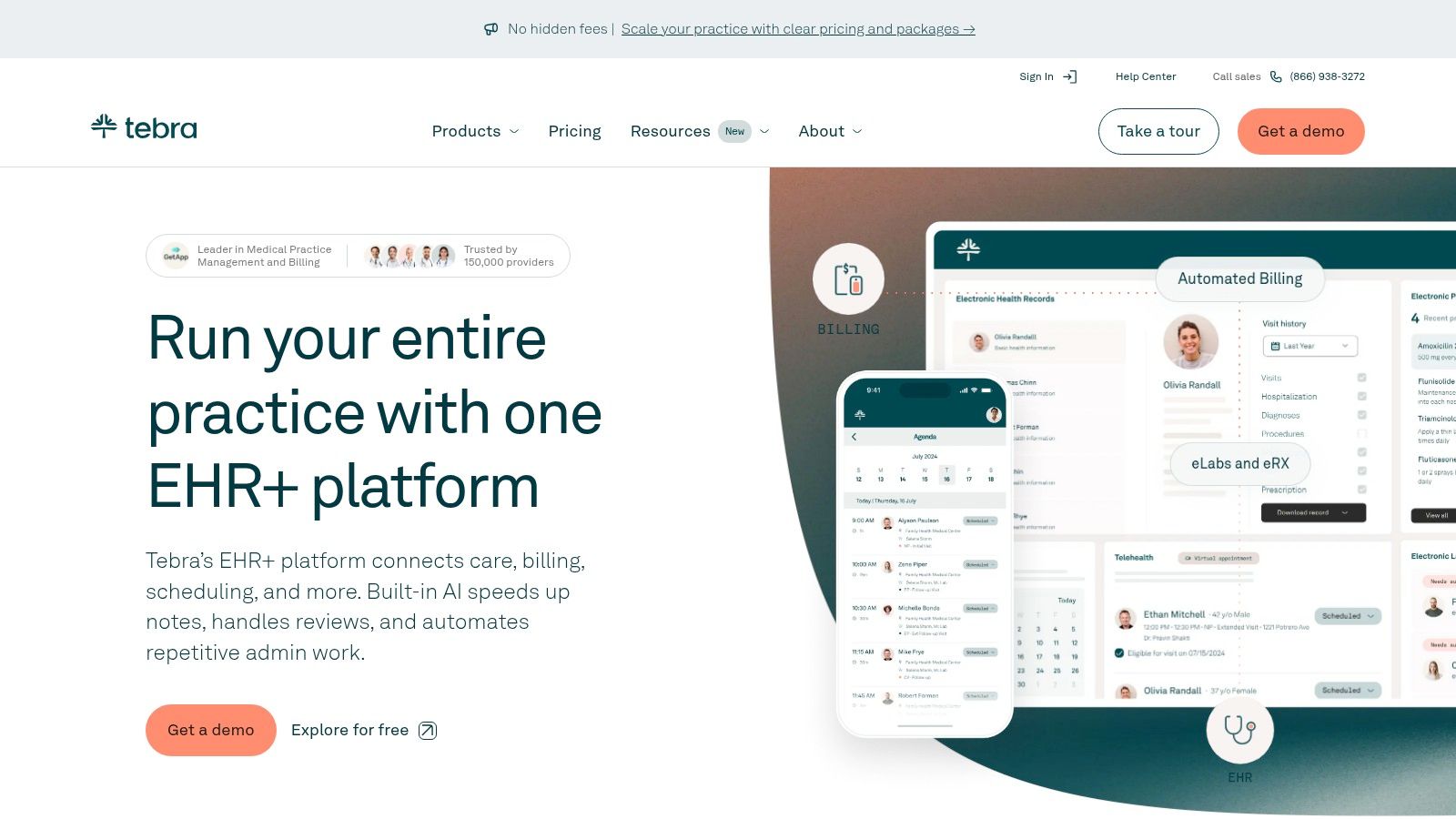
What makes Tebra unique is its integrated approach to practice success. Beyond standard EHR functions like charting and telehealth, it offers add-on services for website management, online reputation, and patient acquisition. This all-in-one model simplifies technology for practices that don't want to juggle multiple vendors. While its onboarding is known for being quick and its platform is purpose-built for smaller clinics, the pricing isn't transparent. Costs are quote-based and can increase as you add more marketing or billing services, with some core features gated behind higher-tier plans. To optimize patient workflows, consider using a high-quality patient intake form template which can seamlessly integrate with such platforms.
Key Details:
- Best For: Small, independent practices seeking an all-in-one platform that combines clinical EHR with practice growth tools.
- Pricing: Quote-based pricing; tiers are available for different practice sizes and needs.
- Website: https://www.tebra.com
10. DrChrono
DrChrono stands out as one of the best EHR systems for small practices that are tech-forward and value mobility. Built from the ground up for Apple devices, its native iOS apps for iPad and iPhone offer a seamless and intuitive mobile charting experience, making it a favorite among providers who need to work on the go. This all-in-one platform combines EHR, practice management, and RCM into a single, cohesive system designed to streamline clinical and administrative workflows, all with a modern, consumer-grade feel.
What makes DrChrono unique is its commitment to customization and connectivity. The platform features highly customizable medical forms and templates, an extensive app directory for third-party integrations, and an open API that allows practices to build their own custom solutions. This flexibility is a major draw for specialty practices with unique documentation needs, such as physical therapists or chiropractors. However, its pricing is not publicly listed, and costs can escalate with add-on fees for services like e-faxing and text reminders. This makes it crucial for practices to get a detailed quote upfront to understand the total cost of ownership.
Key Details:
- Best For: Mobile-first small practices and specialties (like chiropractic or physical therapy) that need high levels of customization.
- Pricing: Custom-quoted. Third-party estimates vary widely, and additional fees for certain features are common.
- Website: https://www.drchrono.com
11. Greenway Health (Intergy)
Greenway Health's Intergy platform is a mature system designed for growing small practices and multi-specialty ambulatory groups that need more than a basic EHR. It offers deep clinical capabilities and specialty-specific templates, making it one of the best EHR systems for small practices with complex or specialized workflows. Unlike many newer cloud-only systems, Intergy provides flexible deployment, allowing practices to choose between a hosted solution or an on-premises server, which can be a critical factor for clinics with specific data security or control requirements.
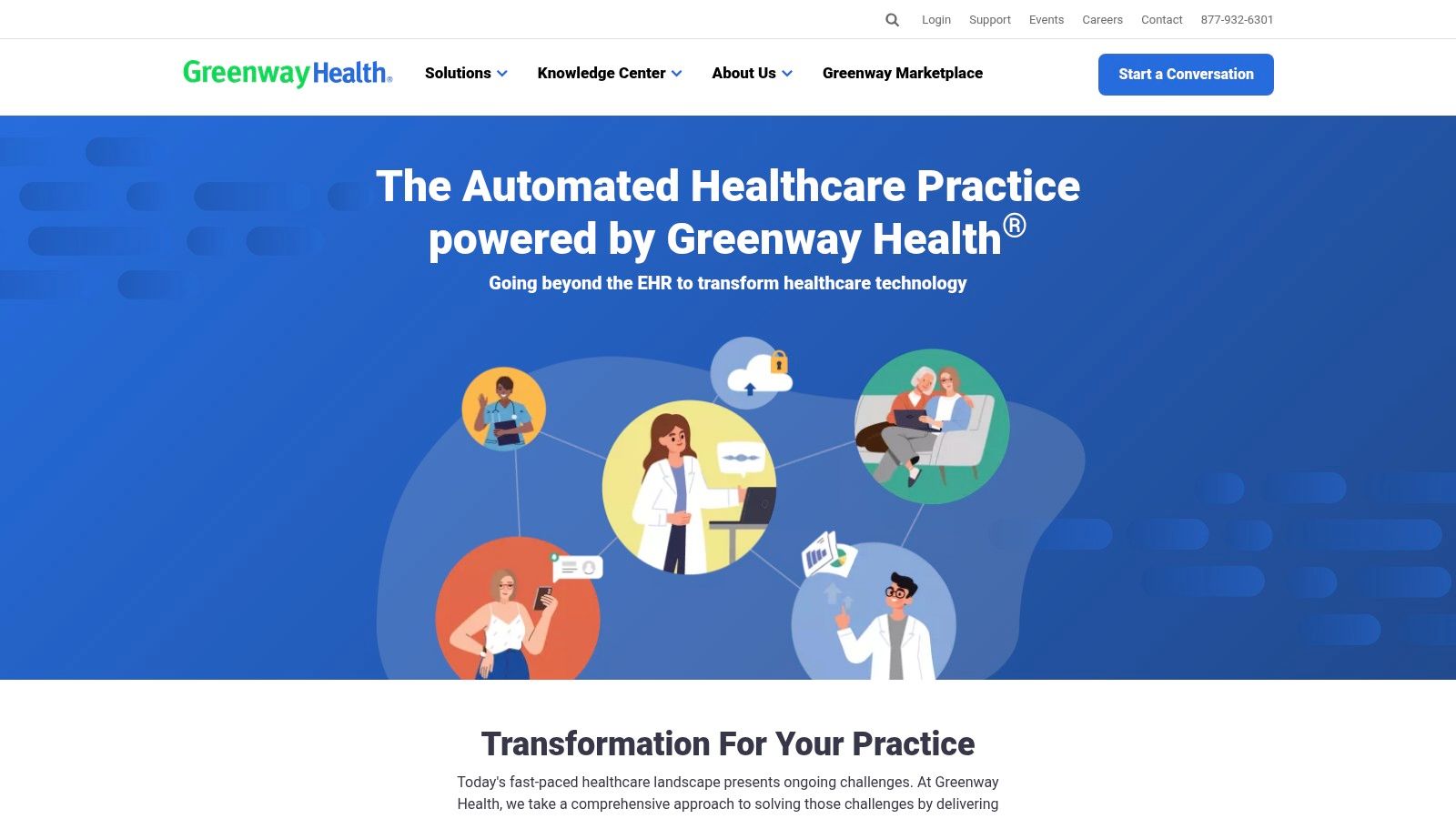
What makes Intergy stand out is its robust framework for interoperability and reporting. As a founding member of the CommonWell Health Alliance, it excels at data exchange, which is crucial for coordinated care in complex patient populations. The system also features powerful analytics for managing population health and meeting MIPS or UDS reporting requirements. However, this depth comes with a tradeoff. Its implementation can be more intensive than lighter EHRs, and the platform is best suited for practices prepared to invest time in customization to fully leverage its capabilities. It's a powerhouse for practices that prioritize data and comprehensive reporting over out-of-the-box simplicity.
Key Details:
- Best For: Established or growing ambulatory practices, especially multi-specialty clinics that require deep customization and robust reporting.
- Pricing: Not publicly listed; requires a custom quote based on practice size, specialty, and required features.
- Website: https://www.greenwayhealth.com
12. CharmHealth
CharmHealth is an incredibly flexible, cloud-based platform that earns its spot among the best EHR systems for small practices due to its unique and budget-friendly pricing models. It is particularly well-suited for solo practitioners, startups, and clinics with fluctuating patient loads. The system offers a comprehensive suite of tools, including a fully-certified EHR, practice management, billing, and integrated telehealth, all accessible from a clean, modern interface. This combination of features and affordability makes it a strong contender for new practices.
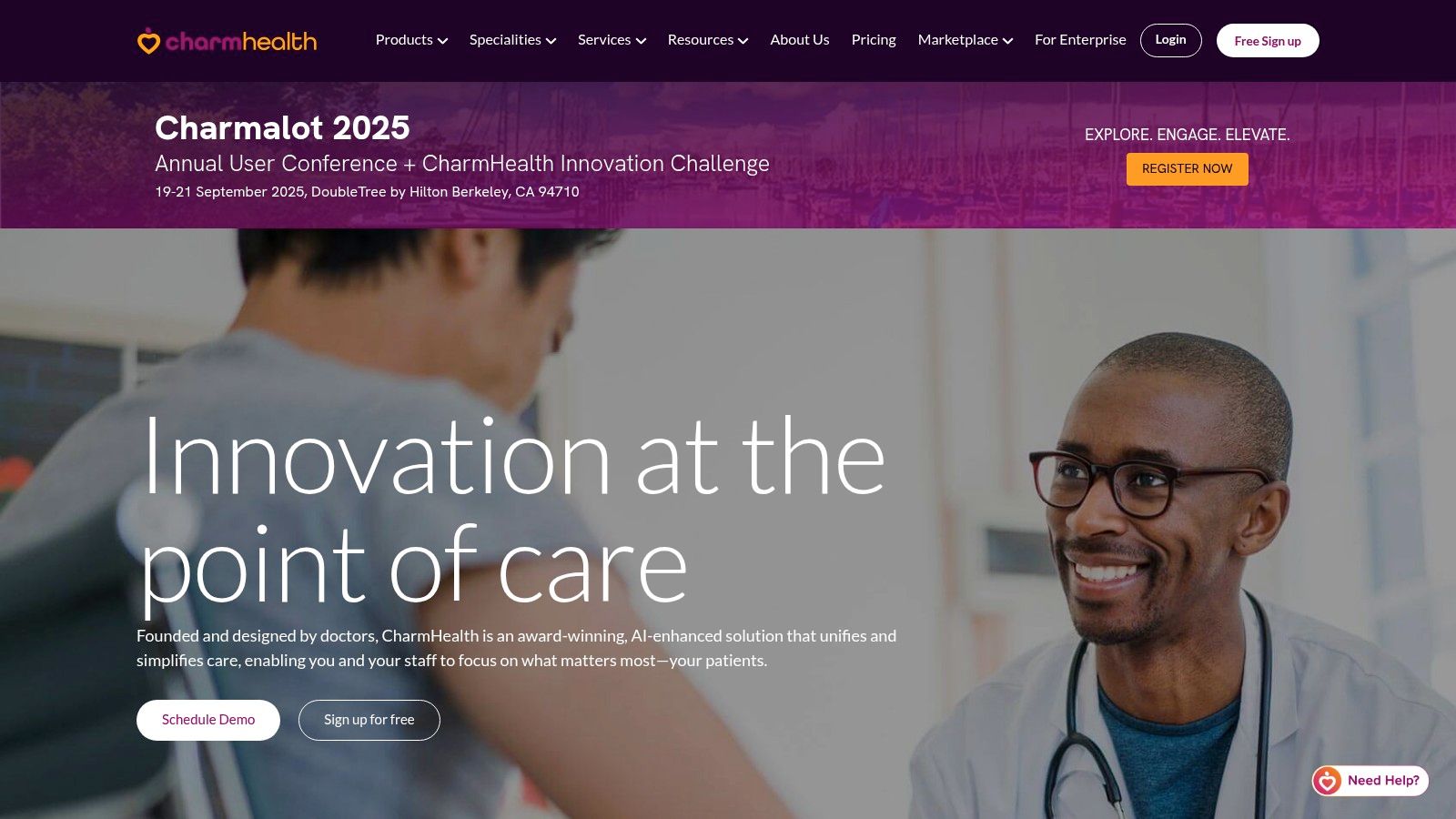
What makes CharmHealth stand out is its "Free for Life" plan for up to 50 encounters per month and its encounter-based pricing model. This pay-as-you-go approach allows practices to scale costs directly with patient volume, avoiding hefty fixed monthly fees that can strain a new business. This modularity is excellent for cost control. However, essential features like e-prescribing and submitting claims are paid add-ons in the lower tiers. This means practices must carefully calculate their anticipated usage to estimate total monthly spending, as costs can vary. It's an ideal choice for practices that want to minimize financial risk while getting started.
Key Details:
- Best For: Startups, solo practitioners, and low-volume clinics needing a scalable, low-cost entry point.
- Pricing: Free plan for up to 50 encounters/month. Paid plans start with a low monthly minimum based on encounter volume or a per-provider model.
- Website: https://www.charmhealth.com
Top 12 EHR Systems Feature Comparison
| Platform | Core Features ✨ | User Experience ★★★★☆ | Value Proposition 💰 | Target Audience 👥 | Unique Selling Points 🏆 | Price Points 💰 |
|---|---|---|---|---|---|---|
| Practice Fusion | ONC-certified EHR, e-prescribing, labs | User-friendly, small-practice workflows | Transparent pricing, easy start | Small & solo practices | Flat per-provider pricing, included staff seats | Low to moderate, some add-on fees |
| eClinicalWorks | EHR, PM, RCM bundles, cloud, mobile apps | Robust, scalable, 24/7 support | Scales solo to multi-provider | Small groups to larger practices | Collections-based RCM option, cloud hosting | Mid-tier; clear published pricing |
| Office Ally EHR 24/7 | EHR+PM+clearinghouse, modular add-ons | Basic interface, budget-friendly | Very low cost, free PM & clearinghouse | Small/low-volume clinics | One vendor for all, lowest entry pricing | Very low, add-ons extra |
| Elation Health | EHR+Billing, telehealth, AI note assist | Clinician-centric, strong continuity | Transparency, strong clinical UX | Primary & direct primary care | AI note assistance, real-time eligibility | Higher end, annual commitment |
| athenahealth (athenaOne) | EHR+PM+RCM, payer connectivity, updates | Flexible model, success-aligned pricing | Outsourced billing, reduces workload | Small practices needing RCM | Co-sourced RCM, strong payer rules engine | Not public, collections-based |
| AdvancedMD | Modular EHR+PM+RCM, build-a-bundle, add-ons | Flexible packaging, tailored for growth | Per-encounter pricing lowers cost at low volume | Low-volume & specialty practices | Highly customizable, telemedicine & analytics add-ons | Mid to high; many add-ons |
| CareCloud | Integrated EHR+PM+RCM, patient engagement | Clean UI, customizable templates | Start with PM only option | Small practices | Consultative onboarding, competitive pricing | Moderate; setup fees common |
| NextGen Office | Cloud EHR+PM, AI Ambient Assist, mobile | Strong mobile focus, comprehensive training | AI-assisted notes, tablet-friendly | Small practices | AI Ambient Assist for SOAP notes | Quote-based; add-ons increase cost |
| Tebra | EHR+PM+RCM, mobile-friendly, marketing tools | Easy onboarding, purpose-built for small | Low-volume tiers, marketing add-ons | Independent small practices | Built-in telehealth & portal, marketing options | No flat pricing, quote-based |
| DrChrono | EHR+PM+RCM, native iOS apps, open API | Mobile friendly, customizable | Tech-forward, extensive telehealth | Tech-savvy small practices | Open API, broad app ecosystem | Pricing not public; add-on fees |
| Greenway Health | Specialty templates, analytics, deployment flex | Deep ambulatory features, strong reporting | Mature platform, population health tools | Growing small/multi-specialty | Hosted or on-premises options | Pricing not public; heavier setup |
| CharmHealth | Encounter/per-provider pricing, telehealth, RCM | Highly customizable, transparent pricing | Budget-friendly free & pay-as-you-go plans | Small, solo, startups | AI scribe, QuickBooks integration | Very low entry; many paid add-ons |
Making Your Final Choice and Automating for the Future
Choosing from the long list of the best EHR systems for small practices can feel like the final, daunting step in a long journey. We’ve explored a dozen powerful platforms, from the intuitive design of Elation Health to the comprehensive suite offered by athenahealth. Each solution presents a unique combination of features, pricing structures, and implementation models. The right choice isn't about finding a universally perfect system; it's about identifying the one that seamlessly integrates with your practice's specific workflow, specialty, and growth ambitions. It’s a strategic decision that will shape your practice’s efficiency, profitability, and capacity for patient care for years to come.
Key Takeaways for Your Decision
As you move forward, keep these core principles in mind. Your practice size, patient volume, and technical expertise will heavily influence which platform feels right. A solo practitioner might prioritize the simplicity and low upfront cost of a system like Office Ally, while a growing multi-provider clinic may need the robust scalability found in AdvancedMD or CareCloud. Don't underestimate the importance of the user interface. An intuitive, easy-to-navigate EHR will reduce staff training time and minimize daily frustration, leading to higher adoption and better patient care. The best technology is the technology your team will actually use consistently and effectively.
The selection process shouldn't happen in a vacuum. It's crucial to involve your entire team, from front-desk staff to clinical assistants and fellow physicians. Their hands-on perspective is invaluable. Create a shortlist of your top two or three contenders and schedule live, personalized demos. Prepare a checklist of "must-have" features and real-world scenarios to test during these demonstrations. Ask questions specific to your specialty. How does it handle a new patient visit? How many clicks does it take to refill a prescription? This collaborative approach ensures the chosen EHR supports everyone's role effectively, not just the practice owner's.
Implementation and the Power of Automation
Remember, selecting an EHR is just the beginning. The implementation phase is where your decision truly comes to life. A successful rollout depends on clear communication, thorough training, and a well-defined data migration plan. Partner with a vendor that has a proven, supportive onboarding process. Beyond the core EHR functionalities, the key to building a truly efficient modern practice lies in automation. Look for systems with strong integration capabilities or built-in tools that handle routine, time-consuming tasks.
One of the most immediate and impactful automation features to consider is the provision for automated appointment reminders, which can drastically reduce no-show rates and free up administrative staff. This is just one example. By layering intelligent automation on top of a solid EHR, you can reclaim countless hours previously spent on manual processes like patient intake, eligibility checks, and prior authorizations. This combination allows your team to shift its focus from administrative burdens to what truly matters: providing exceptional patient care and building a resilient, future-ready practice.
Ready to take your practice's efficiency to the next level? While your EHR manages clinical records, Simbie AI can handle the rest. Our intelligent automation platform integrates with your systems to automate patient intake, scheduling, and billing, freeing your staff to focus entirely on patient care. Discover how Simbie AI can transform your small practice today.

